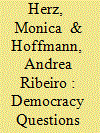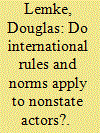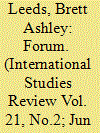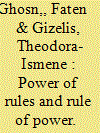|
|
|
Sort Order |
|
|
|
Items / Page
|
|
|
|
|
|
|
| Srl | Item |
| 1 |
ID:
166755


|
|
|
|
|
| Summary/Abstract |
Many international-relations scholars assume that stronger states get their way in world politics. The books reviewed here provide a coherent research program that challenges that notion. By treating asymmetrical international relations as an analytical category distinct from relations attaining among peer states, the authors make theoretical and empirical progress in addressing puzzles about why stronger states do not always prevail. These contributions matter for students of small-state foreign policy, of U.S. foreign policy, and of international hierarchy. This essay describes and reviews the new research program while showing how it could build connections to the literature on hierarchy and international relations.
|
|
|
|
|
|
|
|
|
|
|
|
|
|
|
|
| 2 |
ID:
166754


|
|
|
|
|
| Summary/Abstract |
Practices of informal governance have become more frequent in the last decades, and several scholars have highlighted its positive effects to address the shortcomings of global governance. We discuss this trend from the perspective of the debate of democratic theory regarding the concentration of power. We explore mechanisms that evolved to deal with the concentration of power at the level of modern nation-states: the separation of powers, citizen vigilance, and deliberation. These ideas are treated as challenges for informal global governance. We call for an innovative dialogue between democratic theory and the literature on informal international governance, moving the discussion beyond the debate on the democratic deficit at the global level.
|
|
|
|
|
|
|
|
|
|
|
|
|
|
|
|
| 3 |
ID:
166752


|
|
|
|
|
| Summary/Abstract |
The nonstate actors of interest in this article are territorial contenders: political entities that control populated territory, function like sovereign states but are not recognized as sovereign states by other members of the international system. Sometimes they are de facto states, sometimes they are rebel groups, sometimes they are neither of these, instead existing in control of territory with neither conflict against the sovereign state within whose borders they exist nor claims to a state of their own. New data about territorial contenders permit me to evaluate arguments about changing rules and norms in the international system. I find support for claims about the consequences of changing rules about which actors are recognized as sovereign states but not for claims about a norm against conquest after World War II. In the discussion section, I consider implications of these findings for future research.
|
|
|
|
|
|
|
|
|
|
|
|
|
|
|
|
| 4 |
ID:
166751


|
|
|
|
|
| Summary/Abstract |
Scholars of international studies frequently examine the interaction of power and rules in their subject of study. Our profession also has significant power dynamics and rules that are mutually constitutive. In this forum, four scholars consider aspects of the current formal and informal rules of the profession of international studies that influence our field.
|
|
|
|
|
|
|
|
|
|
|
|
|
|
|
|
| 5 |
ID:
166750


|
|
|
|
|
| Summary/Abstract |
The 2018 Presidential Theme for the International Studies Association’s Annual Conference was “Power of Rules and Rule of Power.” The theme underlines the importance of recognizing the relative and relational influence of power and rules in international politics. To do so, research should examine official rules but also probe what role informal rules play in shaping formal regulations of international interactions and power dynamics. The nexus of actors, issues, and interactions define international relations as a research field but also impact international studies as a profession. The articles included in this special issue and the forum expand, question, and problematize such interactions.
|
|
|
|
|
|
|
|
|
|
|
|
|
|
|
|
| 6 |
ID:
166753


|
|
|
|
|
| Summary/Abstract |
Informality is a fact of international life. Plethora of unwritten rules, unofficial processes, informal meetings, unconventional practices, and ad hoc bodies govern the international system. Interviews, memoirs, narratives, and other forms of communication by seasoned diplomats all point to the fact that decisions that have consequential impacts on international politics are taken in informal settings, and numerous studies show that informal institutions fundamentally shape domestic political life. Yet, systematic and explicit accounts of the nature and functions of informal international rules (IIRs) is rare in international relations (IR) scholarship. The oversight means that we are left with many unanswered questions regarding the manner in which informal rules exist and interact in the international system and, in turn, how they shape international political outcomes. This article addresses this gap in knowledge by outlining core characteristics of IIRs and their functions in international political life. The analysis shows that key IIRs are embedded in formal institutions. Thus, while IIRs are distinct from formal international rules and should be studied in their own right, it will be a fundamental error to approach informal rules with a binary mindset.
|
|
|
|
|
|
|
|
|
|
|
|
|
|
|
|
|
|
|
|
|